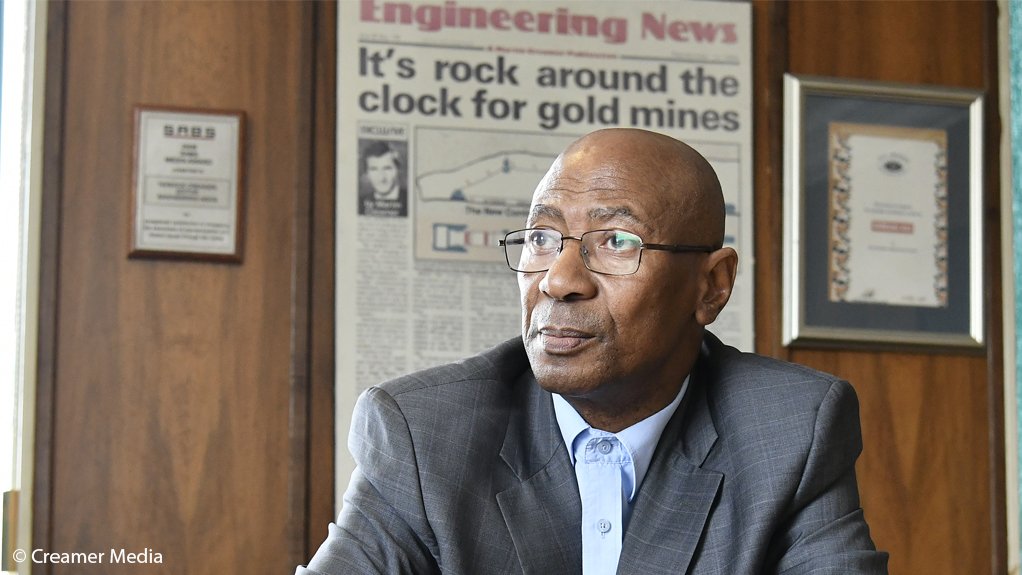SABS acting CEO questions whistleblowers' motives as he offers update on turnaround
South African Bureau of Standards (SABS) acting CEO Blake Mosley-Lefatola has questioned the motives of whistleblowers that continue to raise serious allegations about developments at the organisation, hinting that there might be “elements of corporate sabotage” at play.
Mosley-Lefatola levelled these accusations in a wide-ranging interview with Engineering News, that also included an update on the formal investigation under way at SABS, as well as progress being made to remedy systems compromised by a cyberattack and to appoint a new CEO.
Mosley-Lefatola suggested that the plethora of whistleblower letters sent to parliamentarians, the Department of Trade, Industry and Competition, and the media over the past year might be part of a campaign to undermine the recovery of the beleaguered State entity and further damage its reputation.
This despite the fact that many of the letters contain explicit and passionate pleas for outside intervention to restabilise the SABS and return it to its former status as a respected and efficient organisation.
“I believe there’s a particular grouping of individuals, both internally and externally, who are actively working for the SABS not to be stabilised, because the current state of instability suits them just fine. Why? Well, that’s the issue.”
“Commercially, SABS has competitors. We must remember that. If SABS is not doing well, someone else is likely benefitting from that weakness. So there are those dynamics too, which are becoming very clear – elements of corporate sabotage.”
“Then there are disgruntled individuals that are dissatisfied with the outcomes of the restructuring where roles and positions were significantly changed,” Mosley-Lefatola stated without naming individuals or providing any further details.
Ever since a major cyberattack crippled the SABS in November last year, the organisation has been thrust into the spotlight, with numerous anonymous whistleblower letters and probing media coverage.
These persistent allegations spurred Trade, Industry and Competition Minister Parks Tau to appoint TSU International in February to conduct an independent probe.
The investigation was supposed to have been completed in May. However, the findings have not yet been reported to Tau, who indicated that the recommendations would be implemented and also shared with the Parliamentary Portfolio Committee.
Mosley-Lefatola, who was appointed from outside the SABS in July, assured that the TSU report was nearing completion, explaining that its delayed delivery was a result of its breadth and complexity.
“It’s a fairly wide-ranging investigation containing quite a number of reports, which is why it’s taken so long. There are about 24 or 25 allegations, so there will be 24 or 25 mini-reports. That’s how they’ve been working.
“Whether those accused individuals return to their positions depends on what is in the report. If the report doesn’t find anything implicating them or anything they need to account for, then they will be allowed to return. But if the report identifies misdemeanours or issues they must account for, then due processes will have to be instituted,” he told Engineering News.
Most of the whistleblower allegations relate to the behaviour of the executive leadership at the SABS, which has not had a permanent CEO since July 2018. Only some of the accused individuals have been put on precautionary suspension pending the outcome of the TSU investigation.
Mosley-Lefatola questioned the veracity of some of the allegations, however, and told Engineering News that those found to be spreading false allegations would face disciplinary action.
“We don’t want to clamp down on whistleblowing. You can’t do that. It’s illegal. What we want to actively discourage is the abuse of the whistleblowing facility. If you look at the legislation, it clearly indicates what whistleblowing is about. You can’t use whistleblowing to fight your own personal battles or grudges.”
He cited the Protected Disclosures Act, which stated that an employee who intentionally disclosed false information that caused harm to the organisation or an individual – whether such harm was intended or not – was guilty of an offence.
Mosley-Lefatola insisted that those with legitimate concerns should go through established channels within the organisation.
However, one of the many complaints highlighted in the numerous whistleblower letters seen by Engineering News was that the proper channels for whistleblowing were compromised as they were overseen by the very people accused of corruption and mismanagement.
Democratic Alliance Member of Parliament and spokesperson on Trade, Industry and Competition Toby Chance, who has been monitoring developments at the SABS for months, expressed concern at Mosley-Lefatola’s blanket dismissal of the whistleblower letters.
“I think [Mosley-Lefatola] is very unwise to pre-judge the findings of the TSU report by asserting that whistleblowers are engaged in ‘corporate sabotage’, intent on destabilising the organisation. This appears to suggest he has bought into the narrative of the suspended senior management that they are the victims, rather than the cause, of the problems the SABS is dealing with,” he told Engineering News.
“The overwhelming message coming from the whistleblowers is that bullying, nepotism, bypassing procurement and hiring regulations, ignoring warnings from technical experts and suppliers that the SABS systems are vulnerable to hacking, and a culture of fear have led to a growing crisis that members of the past board have been complicit in ignoring,” Chance said.
STABILISATION PROGRESS?
Meanwhile, Mosley-Lefatola told Engineering News that progress had been made in stabilising the organisation since his appointment and the reconstitution of the board.
“Our focus remains on turning around operations and improving our service levels,” he said, highlighting that, since his appointment, 81 vacant positions had been filled, with a further 89 budgeted for and recruitment under way.
However, several anonymous whistleblowers have alleged to Engineering News that the process used for these appointments was compromised, claiming that the acting CEO and the current head of human resources at the bureau had been engaged in malpractice and nepotism with regards to the new appointments, citing no change from the way things were allegedly done under the previous acting CEO, who was currently on precautionary suspension.
These allegations could not be verified.
In addition to progress on appointments, Mosley-Lefatola noted that several governance structures had been established, including the Technical Forum and the Advisory Forum, which were repeatedly highlighted by the Auditor-General (AG) as governance gaps.
At the start of Mosley-Lefatola’s secondment in July, the bureau was still struggling with the recovery process of its JD Edwards (JDE) enterprise resource planning (ERP) systems following the cyberattack. At the time, only two of the 14 JDE modules had been recovered and the organisation could not produce management accounts.
The SABS was now able to produce its management accounts, Mosely-Lefatola reported.
“We have preliminary draft accounts and will be able to submit our financials to the AG for auditing in January. Moreover, of the 14 JDE modules, 13 have been recovered and are now fully operational. We’re still struggling with one, but that in itself is a major achievement,” he said, adding that a new ERP system was currently being procured to replace the outdated JDE system.
Mosley-Lefatola has also overseen the implementation of a new Certification and Information Management System, while the SABS Standards and Regulatory Affairs Network project has a service provider appointed and is also under way.
Mosley-Lefatola added that a bureau-wide digital transformation initiative was also currently being implemented, along with a competency assessment programme arising from the employee value proposition framework.
In addition, a backlog of 4 452 invoices – amounting to about R172-million – had been cleared.
Mosely-Lefatola also assured that the process to appoint a permanent CEO was under way.
“One of the deliverables for both the board and myself, as acting CEO, is to ensure that, when my secondment expires in July 2026, I am able to hand over to a permanent CEO,” he reported.
He said the previously undertaken process to recruit a CEO had been stopped upon the reconstituting of the board in July, with a new process and new list of potential candidates now under consideration.
“As acting CEO, I’m also anxious for the matter to be finalised, because it impacts my responsibilities . . . People should not act in positions for extended periods. But it’s not deliberate. It’s due to the organisation’s existing challenges. When positions are vacant, people must act in those roles to ensure continuity. The current board and I are now addressing this issue head-on.”
He argued that there was nothing sinister in the delay, despite whistleblower complaints in October that the position of SABS CEO had not yet been advertised.
“From a governance point of view, the position should be advertised. However, given that it has been advertised before, I don’t know how the board is going to approach it this time. They may decide on a combination of both advertising and headhunting. But from a governance and transparency perspective, it’s advisable that the position be advertised,” Mosley-Lefatola conceded.
Chance remained unconvinced, however, indicating that his interactions with Mosley-Lefatola and board chairperson Mzubanzi Bismark Tyobeka had not instilled him with confidence that they were willing to tackle the many whistleblower allegations.
“All the more reason for Tau to release the TSU report without delay so the Portfolio Committee can interrogate its findings and recommend swift action to enable the SABS to write a new chapter in its illustrious history,” Chance said.
Article Enquiry
Email Article
Save Article
Feedback
To advertise email advertising@creamermedia.co.za or click here
Announcements
What's On
Subscribe to improve your user experience...
Option 1 (equivalent of R125 a month):
Receive a weekly copy of Creamer Media's Engineering News & Mining Weekly magazine
(print copy for those in South Africa and e-magazine for those outside of South Africa)
Receive daily email newsletters
Access to full search results
Access archive of magazine back copies
Access to Projects in Progress
Access to ONE Research Report of your choice in PDF format
Option 2 (equivalent of R375 a month):
All benefits from Option 1
PLUS
Access to Creamer Media's Research Channel Africa for ALL Research Reports, in PDF format, on various industrial and mining sectors
including Electricity; Water; Energy Transition; Hydrogen; Roads, Rail and Ports; Coal; Gold; Platinum; Battery Metals; etc.
Already a subscriber?
Forgotten your password?
Receive weekly copy of Creamer Media's Engineering News & Mining Weekly magazine (print copy for those in South Africa and e-magazine for those outside of South Africa)
➕
Recieve daily email newsletters
➕
Access to full search results
➕
Access archive of magazine back copies
➕
Access to Projects in Progress
➕
Access to ONE Research Report of your choice in PDF format
RESEARCH CHANNEL AFRICA
R4500 (equivalent of R375 a month)
SUBSCRIBEAll benefits from Option 1
➕
Access to Creamer Media's Research Channel Africa for ALL Research Reports on various industrial and mining sectors, in PDF format, including on:
Electricity
➕
Water
➕
Energy Transition
➕
Hydrogen
➕
Roads, Rail and Ports
➕
Coal
➕
Gold
➕
Platinum
➕
Battery Metals
➕
etc.
Receive all benefits from Option 1 or Option 2 delivered to numerous people at your company
➕
Multiple User names and Passwords for simultaneous log-ins
➕
Intranet integration access to all in your organisation




















